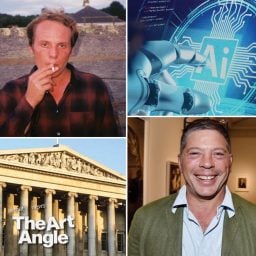Computer scientist Stephen Thaler’s bid to secure a copyright registration for an artwork created by artificial intelligence has been shot down for at least the third time by a Washington, D.C. court.
Judge Beryl A. Howell of the U.S. District Court for the District of Columbia rejected the request in a firmly worded 15-page ruling issued August 18 in which she repeatedly emphasized the lack of “human authorship” in the creation of the work, even as she acknowledged the challenging questions arising out of “new frontiers” related to the wider embrace of A.I. technology by artists.
Thaler develops and owns computer programs he describes as having “artificial intelligence” that are capable of generating original pieces of visual art, akin to the output of a human artist, according to court filings. One such A.I. system—known as “Creativity Machine”—produced the work at issue, which is titled A Recent Entrance to Paradise. It was generated in 2012 and is part of a series Thaler has described as a “simulated near-death experience,” in which an algorithm uses pictures to create trippy images and an invented narrative about the afterlife, according to an earlier report in The Verge.
Thaler attempted to register the work with the U.S. Copyright Office in 2018, identifying the author as the Creativity Machine, and explaining that the work was “autonomously created by a computer algorithm running on a machine.” He sought to claim the copyright as a “work-for-hire to the owner of the Creativity Machine.”
The copyright office denied the application on the basis that the work lacked the necessary human authorship to support a copyright claim, in a refusal letter from August 2019. Thaler requested reconsideration of his application, but the office refused a second time, as outlined in a letter dated March 2020.
After the second refusal, Thaler alleged the office’s decision was “arbitrary, capricious, an abuse of discretion, and not in accordance with the law, unsupported by substantial evidence, and in excess of Defendants’ statutory authority.”
Eventually both sides agreed on the key facts to be used in cross-motions for summary judgment, that would be decided, “on the sole legal issue of whether a work autonomously generated by an AI system is copyrightable.”
The latest ruling granted summary judgment, in agreement with the motion put forth by the copyright office.
While Judge Howell noted the lack of human authorship, she wrote that Thaler “attempts to complicate the issues presented by devoting a substantial portion of his briefing to the viability of various legal theories under which a copyright in the computer’s work would transfer to him, as the computer’s owner; for example, by operation of common law property principles or the work-for-hire doctrine.”
Howell also said that while copyright is “designed to adapt with the times,” that “human creativity is the sine qua non at the core of copyrightability.”
She went on to to write that: “Undoubtedly, we are approaching new frontiers in copyright as artists put A.I. in their toolbox to be used in the generation of new visual and other artistic works. The increased attenuation of human creativity from the actual generation of the final work will prompt challenging questions regarding how much human input is necessary to qualify the user of an A.I. system as an ‘author’ of a generated work.”
Asked for comment, Thaler’s attorney, Ryan Abbott, told Artnet News via email: “We strongly disagree with the District Court’s decision. In our view, the law is clear that copyright is intended to benefit the American public through promoting the generation and dissemination of new creative works, regardless of how those works are made, and if this decision stands it will frustrate the purpose of copyright law. We plan to appeal.”
Abbot said they plan to appeal the decision. Asked about the increasing use and accessibility of A.I. platforms and the potential impact on the decision, Abbott said that “the rise of other generative A.I. systems should not alter the legal arguments, but the rise of such systems makes clear how important this case is to the use and development of A.I. in the creative economy. It also demonstrates the harmful impact of the District Court’s decision.”
More Trending Stories:
An 1837 Portrait of an Enslaved Child, Obscured by Overpainting for a Century, Has Been Restored and Acquired by the Met
Rising Artist Ronan Day-Lewis’s ‘Punk Romanticism’ Imbues Desolate American Landscapes With an Eerie, Cinematic Aura
Why Did Yoko Ono’s Arboretum Art Installation in New York Shut Down Early? ‘Unfortunately, Trees Died’
LGDR Gallery Splits Up After Less than Two Years as Founding Partner Jeanne Greenberg Rohatyn Departs
Photographers Recreate Old Master Paintings in Witty and Profound Ways in a New Show at a Princeton University Art Gallery
Blue-Chip Artworks Seized From Top Portuguese Collector Will Be Featured in New Art Museum in Lisbon
Once Celebrated and Then Forgotten, the French Artist Marie Laurencin Is About to Step Into the Limelight Again, Three Decades After Her Death









